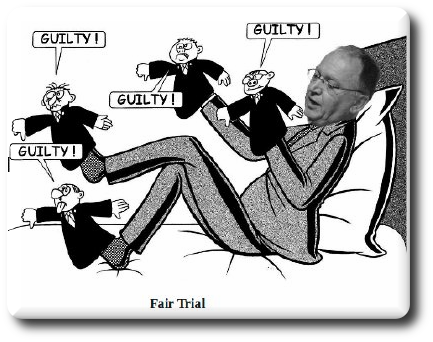

THE EPO's judges still lack independence under António Campinos. It certainly seems like Campinos doesn't intend to fix anything and maybe this is why he's so afraid to meet SUEPO officials, who are growing impatient with him by the looks of it.
"Battistelli made appeals more expensive, knowing that such a move would discourage appeals and thus help hide the profound decline in patent quality -- a point we've made countless times over the years."An article just published by Leythem A. Wall (Finnegan, Henderson, Farabow, Garrett & Dunner, LLP, one of the biggest patent maximalists out there) may be short, but it basically repeats somewhat old news from the EPO when it says: "In one of his last acts as President of the European Patent Office (EPO), Benoît Battistelli has referred a question to the Enlarged Board of Appeal concerning appeal fees and the interpretation of Article 108 EPC. The case is now pending under the reference G1/18."
Battistelli made appeals more expensive, knowing that such a move would discourage appeals and thus help hide the profound decline in patent quality -- a point we've made countless times over the years. What is going to happen next? We're not optimistic. Remember that the Enlarged Board of Appeal, due to decide on matters including this, is not independent. It spoke about it again not too long ago.
"Remember that Battistelli's abuses have played a very considerable role employees' deaths and in the scuttling of the UPC."The media barely mentions any of these issues. Joff Wild, for example, has just mentioned "President Benoît Battistelli" again (at IAM). This can become a serious reputational liability if Battistelli gets arrested some time in the future (not his extremely violent bodyguard). After Benoît Battistelli wrote articles for IAM and was given a keynote slot by IAM they still treat him as some sort of champion with a "legacy". What exactly is his legacy? Corruption? Construction site? Serious brain drain? The death of the UPC? Remember that Battistelli's abuses have played a very considerable role employees' deaths and in the scuttling of the UPC.
There's no "Future Unified Patent Court". We're pretty certain of that. But pro-UPC propaganda blogs such as Kluwer Patent Blog now give the platform to "Intellectual Property Rechtsanwälte" Thomas Musmann, whose biases are revealing. From yesterday's blog post:
IIAs are treaties under public international law that are not specific intellectual property (IP) agreements, such as TRIPs. Rather, they generally protect property rights against state interference. To date, arbitral tribunals have rendered decisions in four IP-related international investment disputes. Whereas the Eli Lilly v. Canada award pertained to a dispute involving decisions of state courts, arbitral proceedings based on an IIA may also be considered as a special appeal mechanism concerning IP-related decisions of international organizations, e.g. the European Patent Office (EPO) or the future Unified Patent Court (UPC). Thus, they could represent an alternative to other extraordinary remedies which have already been used for challenging EPO decisions, e.g. constitutional complaints before the German Federal Constitutional Court or applications submitted to the European Court of Human Rights (ECHR).
"We expect the German FCC, ECHR, ILO and others to play a role in the scuttling of whatever remains of UPC hopes."Team UPC has in general been very quiet for months and not because it's summer. Bad legislation dies in the midst of inaction, not because its death is announced (it 'hibernates'). The UPC is dead. Even if Britain decided to can Brexit and remain in the EU, the UPC would still be dead. It's no longer the UK that acts as a barrier; there are several constitutional issues, EPO corruption and a lot more. ⬆